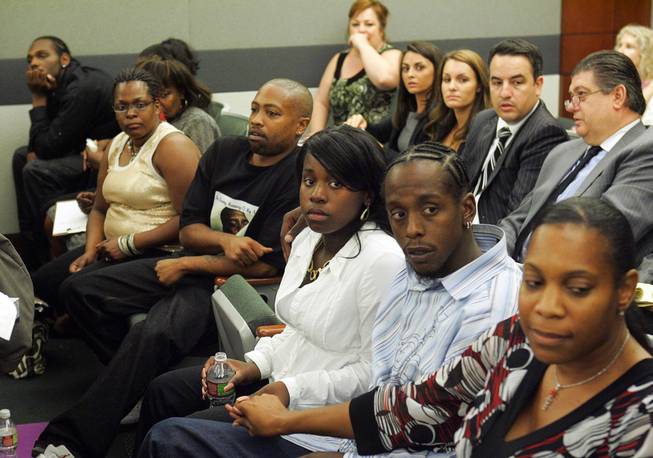
Trevon Cole’s fiancee Sequioa Pearce, center in white, sits with friends and family members after testifying in a coroners inquest at the Regional Justice Center Friday, August 20, 2010. Cole was shot and killed by Metro Police in June.
Published Friday, Aug. 20, 2010 | 8:38 a.m.
Updated Friday, Aug. 20, 2010 | 11:56 p.m.
Sun Archives
Trevon Cole shooting
UPDATED STORY: Jury: Metro detective justified in fatal shooting
Five days before her baby girl was due, Sequioa Pearce was snuggled in bed with her fiance in their east Las Vegas apartment.
The young couple was watching a documentary about Los Angeles gangs at about 9 p.m. on June 11 when they heard a knock at the door.
Shortly thereafter, a Metro Police narcotics unit rammed its way through the door and swarmed into their home to execute a warrant.
Shortly thereafter, Pearce’s fiance, 21-year-old Trevon Bertwane Cole, was shot dead.
The officer who fired the single bullet, Metro Police Detective Bryan Yant, is expected to testify Saturday at the continuation of a coroner’s inquest into Cole’s slaying.
Cole, who was hiding in the bathroom, wasn’t armed when he was shot. No guns were found in their home at the Mirabella apartment complex, 2850 E. Bonanza Road.
Police have said Cole made a “furtive movement” in the moments before Yant pulled the trigger but have not elaborated. Fellow officers involved in carrying out the search warrant testified Friday that although they heard the gunshot, none of them witnessed the interactions between Yant and Cole in the moments before the shooting. The officers testified that as they were knocking on the door and also once inside the apartment, they yelled to identify themselves as police officers with a search warrant.
•••
A coroner’s inquest is a process used to determine facts surrounding deaths involving law enforcement officers. Seven jurors will determine whether the shooting of Cole was justified, excusable or criminal.
Yant, who has been with Metro since 2000, has been involved in two other police shootings during his time with the department. One of those previous shootings was fatal.
Yant was found to be justified in his previous shooting.
Unlike a criminal or civil trial, the inquest process is not adversarial in nature — witnesses aren’t cross-examined, and the district attorney’s office is in charge of presenting exhibits and questioning witnesses.
Other attorneys and relatives are permitted to ask questions during the proceedings, but they must be submitted in writing.
On Friday, attorneys representing the Cole family, the ACLU and the police officers submitted dozens of questions for the witnesses who took the stand. By the conclusion of proceedings Friday evening, more than 300 questions had been put on the record.
In addition to being asked questions about his actions on the night of the raid, Yant is likely to face scrutiny about an affidavit he made in support of the warrant for Cole’s apartment.
In questioning other detectives involved in the raid, deputy district attorneys Chris Owens and Christopher Laurent made no bones about pointing out on Friday that information in the affidavit about Cole’s criminal history was incorrect.
In the affidavit, Yant said that Cole had an extensive criminal history in California and in Texas. A person by the name of Trevon Cole did have such a history, but that person had a different date of birth and weighed significantly less, prosecutors said.
In the affidavit, Yant implied that Cole was a big-time drug dealer and said he expected the search to yield elaborate records of drug transactions, drug paraphernalia and firearms.
Marijuana, digital scales and $702 in cash were found in the apartment. No records or guns were found, according to court documents.
Yant is also likely to face questions about whether he adhered to the tactical plan agreed to in a pre-raid briefing.
Among other inconsistencies, Yant, in a taped statement made after the shooting, told homicide investigators that officer Stuart Richmond was supposed to be his partner for the execution of the warrant. Portions of that recording were played for the jury.
Richmond testified Friday that he was guarding the rear of the team as they were making entry into the apartment and was not assigned to back up Yant.
According to testimony, the lights were out in the apartment except for light from a 42-inch television, a soft light in the kitchen area and light from the detectives’ flashlights.
Yant’s flashlight wasn’t working, prosecutors said, and he is alleged to have kicked in the bathroom door and shot at Cole in the dark.
•••
Pearce, 20, said from the stand that at first she thought the person at the door was her mother. She hid because she didn’t want to deal with her.
When she heard the front door being smashed in, she feared it was intruders, she said, because the two had recently moved to the area and knew of other violent crimes happening nearby.
She told the jury she could see Cole in the bathroom before he was shot. She said the light from the television was enough to illuminate the room where she could see Cole’s reflection in the mirror from where she was in the bedroom.
He had his hands up before he was shot, she said.
Her statements in court contradicted statements she made to homicide investigators immediately after the shooting. In her taped statement, she told police twice she didn’t see Cole get shot because she was still in the bedroom closet.
She said from the stand that at the time, she was in shock and had blocked out what she saw, but in the days after the shooting, she remembered what she truly had seen, she said.
Laurent grilled her as to whether she was changing her story because she was planning a lawsuit against Metro.
“Now that you’ve hired an attorney, your story has changed,” he said.
She said in addition to being in shock, she was afraid of the police officer interviewing her.
“I know I didn’t do anything wrong, but they had just shot an unarmed man, so who knows,” she said.
Pearce acknowledged from the stand that she knew Cole was using and selling marijuana. She said he was getting training in selling insurance.
Dr. Lisa Gavin, a medical examiner with the Clark County Coroner’s Office, testified that Cole was shot in the left cheek. She said she ruled the death a homicide with the official cause of death being a gunshot wound to the head.
The force from the bullet led to concussion injuries so severe they caused his death, she said.
She also said the position in which Cole’s body was found indicated he was likely facing the toilet when he was shot. Prosecutors said he was in the bathroom flushing marijuana down the toilet as detectives were entering the home.
A toxicology report indicated Cole had THC in his system at the time of his death.
•••
In April, Yant had found an ad Cole posted on Craigslist advertising that he sold marijuana and asked Metro Detective Christopher Cannon to contact him. In the weeks leading up to the shooting, Cannon, operating as an undercover officer, purchased about $900 worth of marijuana from Cole.
One of those transactions was captured on video recorded by a reality television series that was filming Cannon and other officers doing undercover work. That footage was played for the jury on Friday.
In it, a man who appears to be Cole is seen conducting a drug transaction in Cannon’s car.
Cannon and Special Agent Matthew Peak, who works for the Air Force’s Office of Special Investigations, testified Friday morning about the events that occurred at Cole’s residence.
Peak said the Air Force was investigating Cole as possibly a person who had sold narcotics to military personnel at Nellis Air Force Base.
Peak and three other Air Force investigators were present the night the warrant was executed. He said he and his fellow officers remained outside while Metro detectives entered the apartment.
•••
The inquest sparked about a dozen protesters to demonstrate Friday morning outside the courthouse in downtown Las Vegas.
“We feel the inquest system is totally unfair,” said former state assemblyman Wendell Williams, who led the protesters.
Williams leads a group called A League of Action, a recently formed organization that leaders say is aimed at addressing community concerns, such as police incidents its members have said they view as “degrading and humiliating.” Williams called the inquest process a “sham” and said it needs reform.
A number of Cole’s family members traveled to Las Vegas for the proceedings. The courtroom at the Regional Justice Center filled up quickly Friday morning, prompting the use of the overflow room.
Maggie McLetchie, an attorney with the ACLU who was observing the proceedings Friday, was critical of the inquest process. She called for a more open system.
“Without a doubt, this illustrates the need for more transparency and a fairer process,” she said. “The interest today shows that the public is not only concerned about these officer-involved shootings but is also concerned about the process.”
•••
This year, Metro Police officers have been involved in 18 shootings. Five of them have been fatal.
The shooting deaths of Cole and of Erik Scott, a 38-year-old Las Vegas man killed July 10 outside a Summerlin Costco store, have received attention for discrepancies in details surrounding the shootings.
In the case of Scott, authorities said he pointed a gun at an officer, prompting three officers to shoot him. Some witness accounts have contradicted Metro’s version of events.
The family of Scott, a West Point graduate with a concealed weapon permit, has disputed Metro’s version of events and has undertaken a campaign to raise awareness about the incident.
An inquest into Scott’s death, which initially was set for Sept. 3, was postponed and has been rescheduled for Sept. 22.
Along with Yant, Metro Sgt. John Harney and Dan Long, a homicide detective, are expected to testify on Saturday. Las Vegas Justice of the Peace Karen Bennett-Haron is presiding over the inquest.
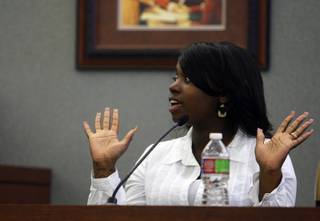
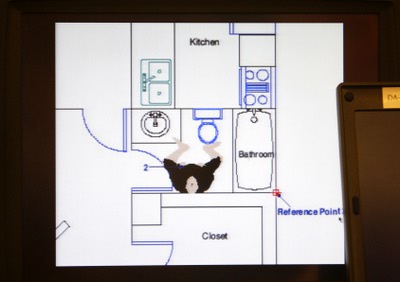
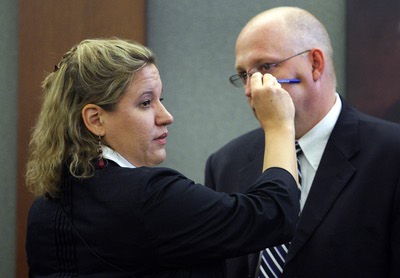
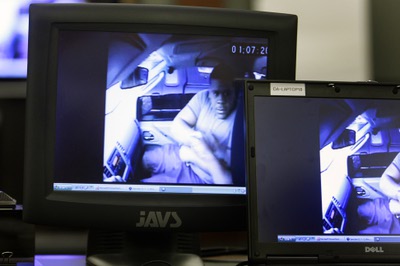
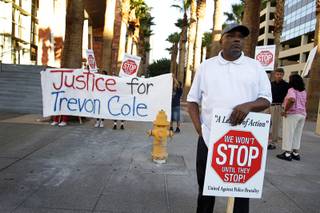

Join the Discussion:
Check this out for a full explanation of our conversion to the LiveFyre commenting system and instructions on how to sign up for an account.
Full comments policy